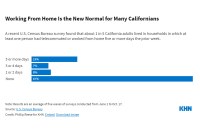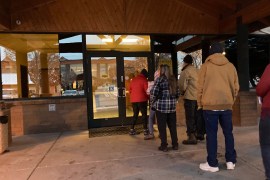Latest KFF Health News Stories
International Rights Group Calls Out US for Allowing Hospitals to Push Millions Into Debt
In a new report, Human Rights Watch urges stronger federal and state action to hold hospitals to account for a medical debt crisis that now burdens more than 100 million Americans.
Biden Admin Implores States to Slow Medicaid Cuts After More Than 1M Enrollees Dropped
Secretary of Health and Human Services Xavier Becerra is asking states to make more of an effort to keep eligible Medicaid recipients enrolled. He particularly fears children losing health insurance coverage.
This Panel Will Decide Whose Medicine to Make Affordable. Its Choice Will Be Tricky.
Colorado’s new Prescription Drug Affordability Board could cap what health plans and consumers pay for certain medications starting next year. The process will pit patient groups against one another.
State Lawmakers Eye Forced Treatment to Address Overlap in Homelessness and Mental Illness
Democratic politicians in California and Oregon are reconsidering the restrictions of involuntary commitment laws. They argue that not helping people who are seriously ill and living in squalor on the streets is inhumane.
El dolor, la esperanza y la ciencia chocan cuando los atletas recurren a los hongos mágicos
El uso de hongos psicodélicos está ganando terreno en los Estados Unidos. Investigadores predicen que la FDA aprobará un tratamiento psicodélico en los próximos cinco años.
Pain, Hope, and Science Collide as Athletes Turn to Magic Mushrooms
A group of former professional athletes traveled to Jamaica to try psychedelics as a way to help cope with the aftereffects of concussions and a career of body-pounding injuries. Will this still largely untested treatment work?
The Biden Administration Vowed to Be a Leading Voice on Opioid Settlements But Has Gone Quiet
Billions of dollars are headed to state and local governments to address the opioid crisis. Policy experts and advocates expect the federal government to play a role in overseeing the use of the money. Failure to do so, they say, could lead to wasted opportunities. And, since Medicaid helps pay health care costs, the feds could have a claim to portions of states’ opioid settlements.
Fatigue Is Common Among Older Adults, and It Has Many Possible Causes
Persistent fatigue — the feeling of having no energy — can contribute to frailty and affects 40% to 74% of older patients with chronic illness. Yet its causes can be elusive.
Feds Move to Rein In Prior Authorization, a System That Harms and Frustrates Patients
The federal government wants to change the way health insurers use prior authorization — the requirement that patients get permission before undergoing treatment. Designed to prevent doctors from deploying expensive, ineffectual procedures, prior authorization has become a confusing maze that denies or delays care, burdens physicians with paperwork, and perpetuates racial disparities. New rules may not be enough to solve the problems.
Ante vacío federal, estados promueven leyes duras contra el uso de sustancias tóxicas en cosméticos
Las hispanas y asiáticas han informado que usan más cosméticos en general que las mujeres negras y blancas no hispanas.
States Seek Crackdown on Toxic Ingredients in Cosmetics to Close Gaps in Federal Oversight
Washington state regulators found formaldehyde, lead, and arsenic in lipstick, powder foundations, skin lotions, and hair products marketed to and popular with women of color. Now legislators there are seeking to ban the products and, like at least a dozen other states, make up for lax federal rules.
Why Two States Remain Holdouts on Distracted Driving Laws
Missouri and Montana are the only states without distracted driving laws for all drivers. With traffic fatalities rising significantly nationwide, some Missouri lawmakers and advocates for roadway safety are eyeing bills in the new legislative session that would crack down on texting while driving in the Show Me State.
Millones en riesgo de perder Medicaid, mientras terminan protecciones por la pandemia
Los estados se están preparando para remover a millones de personas de Medicaid, a medida que expiran las protecciones que se implementaron al comienzo de la pandemia de covid-19.
As Pandemic-Era Medicaid Provisions Lapse, Millions Approach a Coverage Cliff
States are trying to reach millions of Medicaid enrollees to make sure those still eligible remain covered and help others find new health insurance.
Hospital Financial Decisions Play a Role in the Critical Shortage of Pediatric Beds for RSV Patients
Yes, the U.S. is experiencing an unusual spate of childhood RSV infections. But the critical shortage of hospital beds to treat ailing children stems from structural problems in pediatric care that have been brewing for years.
A Work-From-Home Culture Takes Root in California
New U.S. Census Bureau data shows a large segment of Californians are working from home for part or all of the week. Researchers say the shift will ripple through the broader economy in ways big and small.
Por qué algunos estados quieren garantizar Medicaid para los niños desde que nacen hasta los 6 años
La posibilidad de inscribir a los niños en Medicaid, desde que nacen hasta los 6 años, de manera continua y sin papeleo, ayudaría, entre otras cosas, a prevenir las brechas de cobertura.
Stopping the Churn: Why Some States Want to Guarantee Medicaid Coverage From Birth to Age 6
Oregon has become the first state to allow kids to stay in the government health care program from birth to age 6, no matter if their household income changes. California, Washington, and New Mexico are pursuing similar policies.
States Opting Out of a Federal Program That Tracks Teen Behavior as Youth Mental Health Worsens
Colorado, Florida, and Idaho are the latest states to opt out of a survey that tracks concerning behaviors in high school students. Officials cite low participation and state laws that require parental permission. But some advocates say dwindling state participation is an “enormous loss” that will make it harder to track signs of poor mental health — like drug and alcohol misuse and suicidal ideation — among teens.
Blind to Problems: How VA’s Electronic Record System Shuts Out Visually Impaired Patients
Veterans Affairs’ electronic health records aren’t friendly to blind- and low-vision users, whether they’re patients or employees. It’s a microcosm of America’s health care system.






















